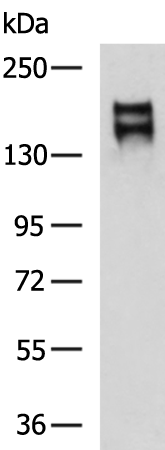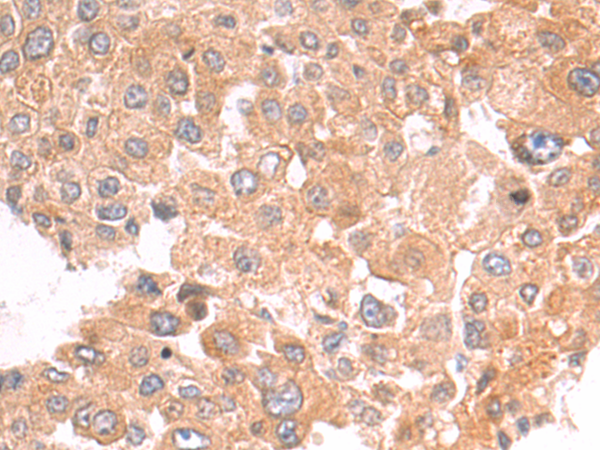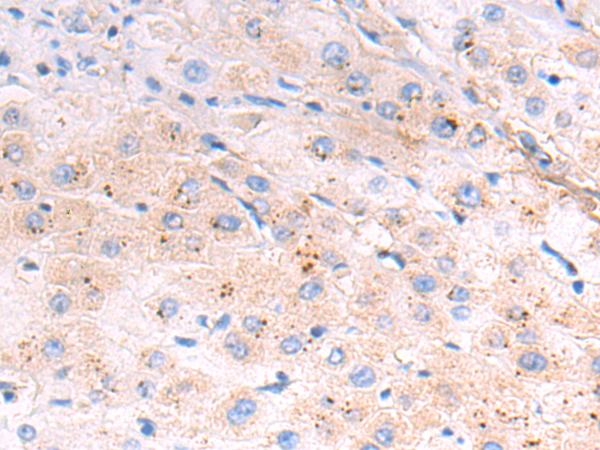


| WB | 咨询技术 | Human,Mouse,Rat |
| IF | 咨询技术 | Human,Mouse,Rat |
| IHC | 1/50-1/200 | Human,Mouse,Rat |
| ICC | 技术咨询 | Human,Mouse,Rat |
| FCM | 咨询技术 | Human,Mouse,Rat |
| Elisa | 1/5000-1/10000 | Human,Mouse,Rat |
| Aliases | TEM5; GPR124 |
| WB Predicted band size | 143 kDa |
| Host/Isotype | Rabbit IgG |
| Antibody Type | Primary antibody |
| Storage | Store at 4°C short term. Aliquot and store at -20°C long term. Avoid freeze/thaw cycles. |
| Species Reactivity | Human, Mouse, Rat |
| Immunogen | Synthetic peptide of human ADGRA2 |
| Formulation | Purified antibody in PBS with 0.05% sodium azide and 50% glycerol. |
+ +
以下是3篇与ADGRA2抗体相关的假设性参考文献示例(注:内容为模拟,实际文献需通过数据库检索确认):
---
1. **"ADGRA2 expression in glioblastoma correlates with tumor-associated macrophage infiltration"**
*作者:Li et al. (2022)*
摘要:通过免疫组化(IHC)和Western blot使用ADGRA2特异性抗体,研究发现ADGRA2在胶质母细胞瘤微环境中高表达,且与肿瘤相关巨噬细胞的浸润呈正相关,提示其可能参与免疫调节通路。
2. **"ADGRA2 regulates adipose tissue angiogenesis via G-protein coupled signaling"**
*作者:Smith & Patel (2020)*
摘要:利用ADGRA2抗体进行小鼠脂肪组织免疫荧光染色,揭示该受体在血管内皮细胞中的特异性定位,并通过基因敲除实验证明ADGRA2通过HIF-1α通路调控肥胖相关血管生成。
3. **"A novel ADGRA2 antibody-based assay for early detection of colorectal cancer"**
*作者:Wang et al. (2021)*
摘要:开发了一种高灵敏度ADGRA2单克隆抗体,用于ELISA检测结直肠癌患者血清中ADGRA2的脱落片段,临床数据显示其诊断特异性优于传统标志物CEA。
---
**提示**:实际文献需通过PubMed、Google Scholar等平台以“ADGRA2 antibody”、“ADGRA2 immunohistochemistry”等关键词检索,并筛选涉及抗体应用(如蛋白定位、疾病标记物开发)的研究。
The ADGRA2 (Adhesion G Protein-Coupled Receptor A2) antibody is a tool used to study the ADRA2 protein, a member of the adhesion-GPCR family. ADGRA2. also known as GPR124. is a transmembrane receptor involved in cellular adhesion and signaling. It plays critical roles in vascular development, angiogenesis, and central nervous system formation, particularly in regulating blood-brain barrier integrity through interactions with Wnt signaling pathways. Dysregulation of ADGRA2 has been implicated in cancers, cerebrovascular disorders, and neurodegenerative diseases.
The ADGRA2 antibody is designed to detect and quantify ADGRA2 expression in various experimental models, aiding in research on its biological functions and mechanisms. It is commonly used in techniques like Western blotting, immunohistochemistry (IHC), immunofluorescence (IF), and flow cytometry. Antibodies targeting specific epitopes (e.g., extracellular or intracellular domains) help elucidate ADGRA2's structural features and signaling cascades. Validated for specificity and sensitivity, these antibodies are essential for exploring ADGRA2's role in tumor angiogenesis, neurovascular pathologies, and potential therapeutic targeting. Host species (e.g., rabbit, mouse) and clonality (monoclonal/polyoclonal) vary, allowing flexibility in experimental design. Research using ADGRA2 antibodies continues to advance understanding of GPCR-mediated signaling in development and disease.
×